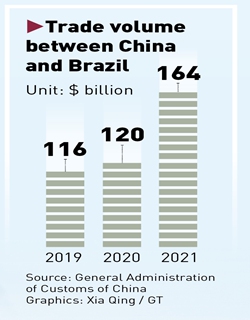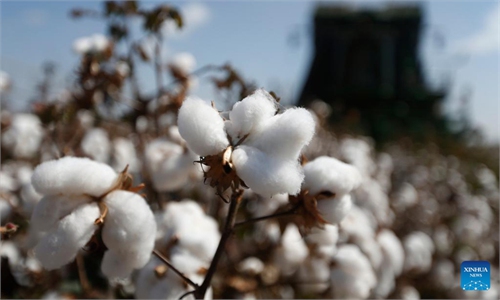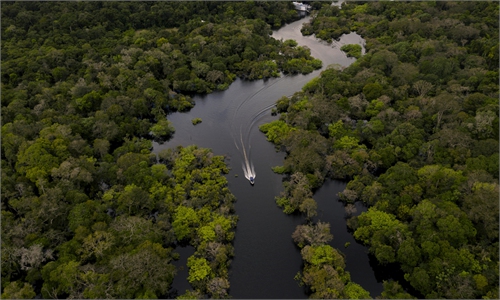BRICS offers chance for leaders’ exchange on solutions to challenges: Brazil’s Ambassador to China
BRICS offers path to joint solutions to challenges: ambassador

Paulo Estivallet de Mesquita Photo: Courtesy of Brazilian Embassy to China
Editor's Note:
Before the 14th BRICS Summit in Beijing on Thursday, Global Times (GT) reporter Liu Yang conducted an exclusive interview with Paulo Estivallet de Mesquita (Estivallet), Brazilian Ambassador to China, in which the ambassador shared his views on China-Brazil cooperation, agricultural trade and prospect of cooperation for the ongoing BRICS summit.

Source: General Administration of Customs of China Graphics: Xia Qing / GT
GT: Since the establishment of diplomatic relations between China and Brazil, in which economic and trade fields have the two countries mainly cooperated? What results have been achieved?
Estivallet: Brazil and China established diplomatic relations in 1974. At the start, both countries had relatively small and closed economies. At the turn of the century, bilateral trade was still very small - about $4 billion in 2001.
After China joined the WTO, trade grew at a very fast pace. In 2021, bilateral trade was in excess of $130 billion. China became Brazil's largest trading partner in 2009. Our trade with China in 2021 was more than twice as large as our trade with the US. In the last two years, Brazil was China's largest supplier of food products. It is also one of its main suppliers of key commodities such as oil, iron ore and pulp. Brazil has also benefited from imports of a very diversified range of products from China.
Bilateral investment flows are more recent, but have also grown at a very fast pace. It is estimated that in the last ten years Chinese companies have invested around $80 billion in Brazil. In addition to the areas involved in the supply of commodities, such as mining, agriculture and transportation, Chinese companies are also taking advantage of the size and prospects of the Brazilian market in areas such as manufacturing and services.
GT: In what areas do you think the two countries will deepen their cooperation in the future?
Estivallet: Trade and investment are presently the mainstay of bilateral cooperation. We already have very good levels of trade and investment. We are convinced, however, that we can achieve much more. Brazil and China have just signed an agreement to avoid double taxation, which will help to further increase and diversify bilateral trade and investment. We are actively pursuing new agreements that will open up possibilities for trade in agricultural goods. We are also confident that once COVID-19 is brought under control, we will see a return of bilateral travel, which is essential for the establishment of new business relationships.
We also see ample scope for cooperation in other areas. We have a traditional cooperation in science, technology and innovation. We have so far developed and launched six satellites under the China-Brazil Earth Resources Satellites (CBERS) program, which started in the late 1980s. We are already working on the next generation of CBERS.
Our cooperation on health issues also has a long history, but it has also received a boost from the pandemic. Chinese vaccines and active pharmaceutical ingredients played a key role in the fight against COVID-19 in Brazil.
We are also looking at further promoting technology based investment and links between Chinese and Brazilian tech firms. China is the second country in number of "unicorns" (startup companies valued at over $1 billion), while Brazil is the ninth. There are obvious opportunities here.
On cultural issues, there has been strong interest in promoting language studies in both countries. We look forward to the reopening of academic exchange programs once COVID-19 allows it. We also have to work on tourism. People-to-people exchanges have been hard hit these last two years and we are anxious to see them flourish again.
In sum, there are huge opportunities and excellent prospects for cooperation across many areas. We have the political will and the institutional mechanisms to support the consolidation and expansion of bilateral cooperation. By the way, the China-Brazil High-level Coordination and Cooperation Committee (COSBAN), which is led by the Vice Presidents of China and Brazil, held its Sixth Meeting a few weeks ago. We reached agreement on two new plans. Both documents offer guidance and support for future cooperation between the two countries.
GT: Is Brazil willing to join China-proposed Belt and Road Initiative?
Estivallet: We view the Belt and Road Initiative with great interest. During President Bolsonaro's visit to China in 2019, our leaders agreed to look for synergies between the BRI and Brazil's investment program. We already have many investment projects that fit these criteria.
GT: What do you think is the difference between Brazil's economic and trade cooperation with China and that of the US?
Estivallet: China and the US are Brazil's first and second largest trading partners. In 2021 we exported $31 billion to the US (11 percent of our exports last year) and imported $39 billion (18 percent of our imports), whereas our exports to China reached $87 billion (31 percent of our total exports) and our imports equaled $47 billion (21 percent of our imports).
The first thing to notice is that Brazil has a trade surplus with China and a trade deficit with the US. The second thing is that trade profiles are very different. Industrialized products represent the bulk of Brazil's trade relationship with the US. With China, on the other hand, trade is relatively concentrated on certain agricultural products and mineral commodities such as soybeans, oil and iron ore.
GT: How do you see the foreign media outlets discrediting China's economic cooperation with Brazil, claiming Chinese investments "economic aggression and plunder"?
Estivallet: The overall perception of our trade and investment cooperation with China is predominantly positive. Brazil's experience with Chinese investment in the last few years has been good, and it is my understanding that Chinese investors are also satisfied with the results and the prospects for their investments in Brazil. Of course, it is important that Chinese companies continue to comply with all relevant laws and regulations, and each investment must be carefully considered on its own merits.
GT: What was the status of Chinese soybean purchases from Brazil in 2021 and in the first five months of 2022? Has the signing of the first phase of the trade agreement between China and the US, and affected Brazil's soybean exports to China?
Estivallet: In the first five months of this 2022, according to Brazilian data, we exported 22.3 million tons of soybeans to China, totaling $12.1 billion.
In 2021, Brazil exported approximately 60 million tons of soybeans to China. That amounted to 70 percent of all Brazil's soybean exports. In 2021, we supplied 60 percent of all Chinese soybean imports. The second largest supplier was the US, with 33 percent.
Notwithstanding the impacts of China-US trade for Brazilian agriculture, Brazil-China soybean trade actually increased: exports went from 54 million to 60 million tons between 2017 and 2021.
Brazil's 2021/2022 harvest is expected to be slightly lower than the last one, due to weather conditions, but production numbers are still strong - around 124 million tons - 60 percent of which will be channeled through exports.
We have followed closely the implementation of the first phase of trade agreement between China and the US and we will continue to monitor any further bilateral agreements. It should be borne in mind that any commitments to purchase fixed amounts of products in disregard of market conditions are contrary to the WTO agreements.
Brazil is a steady and reliable agricultural partner to China, and we are ready to expand agricultural exports, as a whole, and soybean exports in particular.
GT: As the largest developing countries in the Eastern and Western hemispheres and important members of the BRICS mechanism, how can China and Brazil cooperate in the current situation and jointly inject more strength into global development?
Estivallet: First of all, economic and social development in Brazil and in China has reshaped the world. China has been the main driver of world economic growth for many years. On a smaller scale, as an agricultural powerhouse, Brazil is part of the solution to some of the greatest challenges the world faces today. We have built a solid, prosperous and mutually beneficial bilateral relationship. Our countries are working to take this relationship to a new level, diversifying our economic and cooperation agenda and promoting people to people exchanges. In addition to that, as large and complex developing countries we can make major contributions and unique perspectives in areas such as the environment, sustainable development, science and technology and the reform of multilateral institutions.
GT: What are your expectations for the BRICS Summit?
Estivallet: BRICS has allowed Brazil, China, India, Russia and South Africa to engage more directly, without intermediaries and independently of frameworks that reflect different historical circumstances. Brazil attaches particular importance to cooperation among BRICS countries in areas such as economy and finance, trade, health, science and technology and the fight against transnational crime.
We expect that the Summit will reaffirm the commitment of BRICS countries to continue to work together for the benefit of our peoples and to explore new areas for cooperation. It will also offer an opportunity for exchanges between the leaders on the challenges that we face and possible solutions to those challenges.


